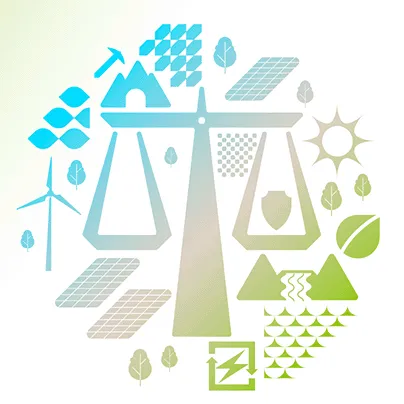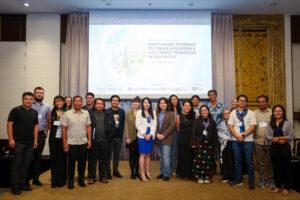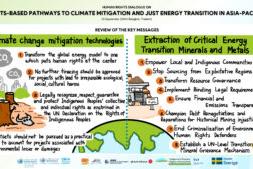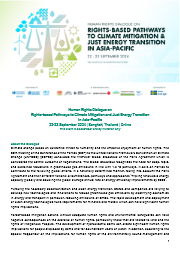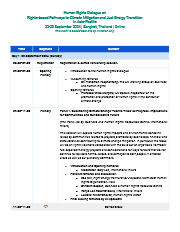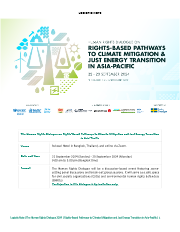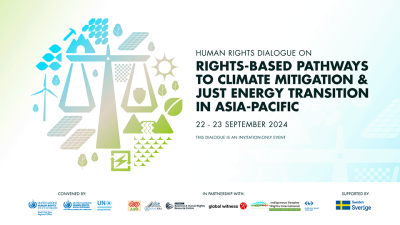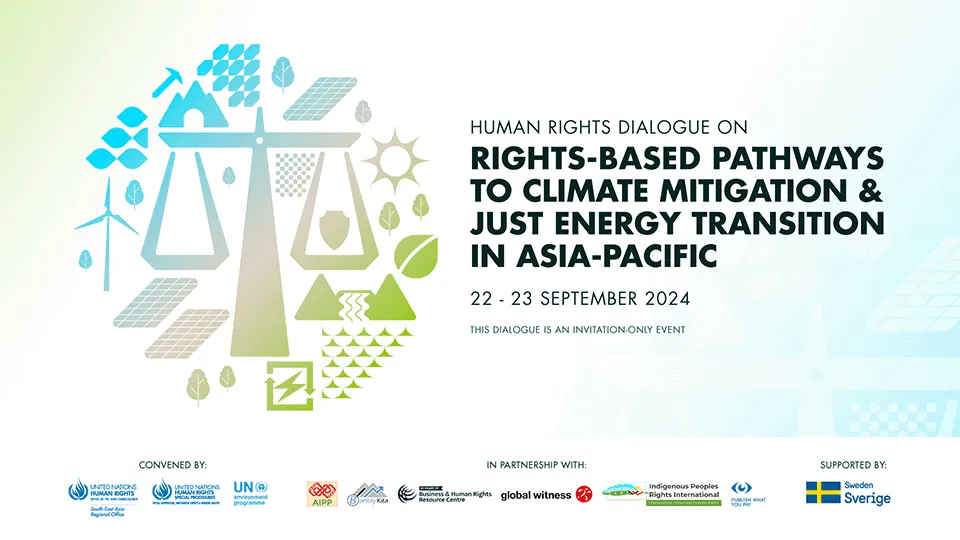
| Date and Venue | The Human Rights Dialogue on Rights-Based Pathways to Climate Mitigation and Just Energy Transition in Asia-Pacific will take place on 22 – 23 September 2024, at the Sukosol Hotel in Bangkok, Thailand, and online via Zoom. |
| Format | The Human Rights Dialogue will be a discussion-based event featuring scene-setting panel discussions and break-out group sessions. It will serve as a safe space for civil society organizations (CSOs) and environmental human rights defenders. Participation in this dialogue is by invitation only. |
About the Dialogue
Climate change poses an existential threat to humanity and the effective enjoyment of human rights. The 28th meeting of the Conference of the Parties (COP) to the United Nations Framework Convention on Climate Change (UNFCCC) (COP28) concluded the first-ever Global Stocktake of the Paris Agreement which is considered the central outcome of negotiations. The Global Stocktake recognizes the need for deep, rapid, and sustained reductions in greenhouse gas emissions in line with 1.5 °C pathways. It calls on Parties to contribute to the following global efforts, in a nationally determined manner, taking into account the Paris Agreement and their different national circumstances, pathways and approaches ‘Tripling renewable energy capacity globally and doubling the global average annual rate of energy efficiency improvements by 2030’.
Pursuing the necessary decarbonization and clean energy transition, States and companies are rallying to develop new technologies and innovations to reduce greenhouse gas emissions by electrifying economies in energy and transport in particular, reducing emissions of GHGs. The rapid development and deployment of clean energy technologies fuels requirements for minerals and metals which can have significant human rights implications.
Forest-based mitigation actions without adequate human rights and environmental safeguards can have negative consequences on the exercise of human rights, particularly those that are related to land and the rights of Indigenous Peoples. The development of hydroelectric dams can create significant human rights implications for people displaced by dams and for downstream users of water. In addition, according to the Special Rapporteur on the implications for human rights of the environmentally sound management and disposal of hazardous substances and wastes, some climate technologies proposed in recent years could aggravate the toxic burden befalling people and the planet, exacerbating the human rights infringements caused by exposure to hazardous substances. Lastly, the extraction of minerals and metals to meet the energy transition and digital transformation can exacerbate the social and environmental impacts of mining, with investors aiming to exploit both land-based mining and deep-sea mining. Data from a Transition Minerals Tracker compiled by the Business & Human Rights Resource Centre (BHRRC) shows that more than 630 allegations of human rights violations have been associated with minerals mining since 2010. Of those, 91 were made in the last year alone.
Land and Environmental Human Rights Defenders are at the frontlines of the global fight against the causes and impacts of the climate crisis. They play crucial roles in advocating for the reduction of current and future greenhouse gas emissions and advancing the transition to renewable energy. However, they remain at risk of harassment and under attack across the globe. Evidence suggests that as the climate crisis intensifies, violence against EHRDs will also increase, whether through assaults, murders, intimidation, harassment, stigmatization, or criminalization.
Recently, the UN Secretary-General launched a high-level Panel on Critical Energy Transition Minerals tasked with developing a set of global principles to “safeguard environmental and social standards and embed justice in the energy transition”. The Secretary-General’s Panel on Critical Energy Transition Minerals seeks to build trust between governments, local communities, and industry, by addressing issues relating to equity, transparency, investment, sustainability and human rights.
Objective
This human rights dialogue is jointly organized by OHCHR SEARO, the UN Working Group on Business and Human Rights, and UN Environment Programme, in partnership with Asia Indigenous Peoples Pact (AIPP), Business and Human Rights Resources Center, Global Witness, Indigenous Peoples Rights International (IPRI) and Publish What You Pay Asia-Pacific Transition Mineral Accountability (AP-TMA) Working Group.
The human rights dialogue will bring together experts from Civil Society Organizations and Environmental Human Rights Defenders in the region to:
1) Discuss the current situation, challenges, and opportunities to promote and protect human rights in the context of climate mitigation and energy transition.
2) Identify innovative strategies for a safe, meaningful representation, inclusion, and participation of rights-holders, civil society organizations (CSOs), Environmental Human Rights Defenders(ehrds), and Indigenous Peoples, including women and youth, to tackle these challenges.
3) Foster an informal network of civil society organizations and advocates in the region to facilitate the sharing of knowledge and experience. These broad issues will be explored through four thematic panel sessions:
A. Climate change mitigation technologies, mechanisms, and carbon markets.
B. Extraction of critical energy transition minerals and metals, environmental implications, land rights, and ocean equity.
C. Safeguarding climate and environmental human rights defenders.
D. Indigenous Peoples, Youth, and Gender perspective.
4) Develop an output document for the UN Responsible Business and Human Rights Forum from 24 – 27 September 2024, COP 29 (12-22 November 2024), and the UN Annual Forum on Business and Human Rights (26-28 November 2024) and relevant regional and international conferences.
For more event coordination information, please contact
Romchat Wachirarattanakornkul (OHCHR Regional Office for South-East Asia) at @email

